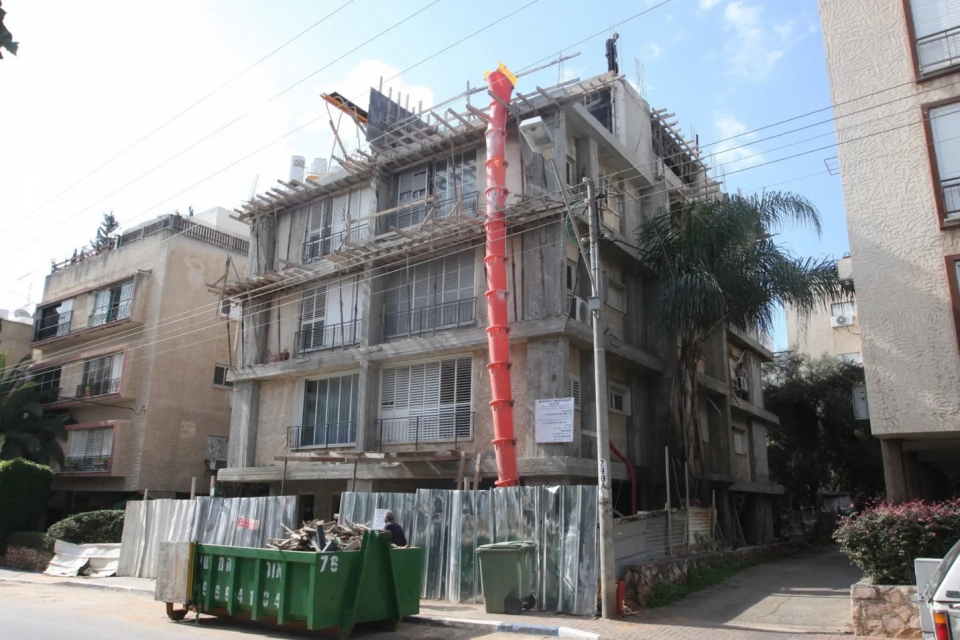The Marker, Yadar Horesh, 01.01.2021
2021 also opens against the background of the well-known real estate discourse: another good year of sales and high demand for apartments, another year of expected shortages in housing supply and price increases - these may even be sharp increases. There was only a "slight blow to the industry" and that soon the coffee corners in the offices would be refilled, and the high-tech companies and lawyers would once again compete for their place in the next gleaming tower.
However, the economic impact of the epidemic is not going to subside in the coming year: deficits, low interest rates and money printing in Israel and Western countries will push up the value of assets and risk levels in capital and real estate markets, after almost a decade of inflation. When you go into the details of the forecast - about the hopes and concerns inherent in it - it turns out that the picture is more complex. Bottom line, it is not certain that every apartment you buy today will cost more at the end of 2021, even if the forecasts rise; The real estate ventures that they paid too much for land, and that they run into difficulties.
Faced with the shortage that is likely to continue in the housing supply, a threat of economic crisis and political chaos hovers over the markets that is expected to extend into next year, so the assumption that this is the right time to buy an apartment or invest in the long term may be wrong. Therefore, behind the estimates of price increases, there is also a considerable fear of a crisis in the industry - mainly due to governmental and economic uncertainty.
Bernard Raskin, CEO of the RE / MAX Israel real estate network, is used to representing the optimistic approach, and even now he claims that there is a reason for this. The best in the history of our network, and the coming year is also going to be characterized by a lot of activity, "he says." The coming year will be strong in all market segments, but there will be changes. I expect that demand for villas, penthouses and garden apartments will increase. This is a trend that started because of the corona crisis and people will continue to prefer large balconies and open yards in the future as well, even after the plague disappears. The prices of spacious apartments will continue to rise faster than the other market sectors, but it may also lead to an expansion of supply and a moderation of demand in some areas. For example, we had good sales in the new neighborhoods of Afula and Harish. One of the reasons is that there is a large supply of apartments of this type in these neighborhoods. "
"In the last decade, governments have tried to cool the housing market, but they have failed - and the result has been a rise in prices."
Bernard Raskin, CEO of the RE / MAX Israel real estate chain
In Raskin's view, the power crisis was also seen as an opportunity. "The instability is holding back the formation of the government. In the last decade, governments have tried to cool the housing market, but they have failed - and the result has been a rise in prices," he adds. "When there is no stability it is more difficult to intervene in the market, and the free market will function better."

Tel Aviv. "Investors are showing interest in neighborhoods like Kfar Shalem and Yad Eliyahu" Photo: Tomer Applebaum
Differences between cities - and gaps between estimates
In mid-2020, the chief economist at the Ministry of Finance, Shira Greenberg, caused a stir - when she revealed in several cases, investors sold apartments at a loss, that is, reported a sale at a price lower than the price they paid for it. Apparently, in most of these cases there were people affected by the Corona crisis or feared a price collapse and sold apartments under pressure. But it was a local phenomenon, which apparently did not gain momentum.
Two of the veteran appraisers in the market point to the places where apartment prices will rise above average as well as to the cities where price shuffling is expected, despite the apparent upward trend. However, it seems that at this stage the gaps between the forecasts indicate that there is great difficulty in estimating what will happen to the market next year.
"At the same time, there is a process of change in the population mix of the old neighborhoods in Tel Aviv: they are populated by young families - so the demand for housing is rising in an area where prices are significantly lower."
For example, the appraiser Levi Yitzhak is surprising in his forecast for price increases ranging from 4% –7% in the Netanya area, of 5% –6% in the Beit Shemesh area and of 3% –5% in the Negev capital, Beer Sheva. However, in the central region he estimates that the increases may also be double-digit. These estimates are partly in line with the estimates of the president of the Builders Association of Builders, Raul Srugo, published here last week, who predicted that prices could jump even more sharply by 10% in some areas.
Levy Yitzhak explains the large gap between the expected price increases in the southeastern neighborhoods of Tel Aviv - where he expects increases of 8% –12% - and the increases in the north-central neighborhoods of the city - where he expects increases of only 2% –3%. According to him, the difference lies in the rapid change in the composition of the population in the neighborhoods. "Apartment prices in the center and north of Tel Aviv are very high and we are witnessing a phenomenon in which young families are selling relatively small apartments in these areas in order to purchase larger and more spacious apartments in the southeast of the city," he says. "In addition, investors are also showing interest in the eastern and southern neighborhoods of the city, so we are witnessing a growing demand for apartments in neighborhoods like Kfar Shalem and Yad Eliyahu. More the demand for housing in an area where prices are significantly lower - almost 50% of the center and north of the city. "
From the other side of the barricade, there are also more moderate and cautious assessments. Chairman of the Chamber of Real Estate Appraisers, Haim Mesilati, expects price increases at a level similar to that recorded in the market last year. The expected exit from the Corona crisis; the development plans that are beginning to be implemented in the closed airport complex;
"Apartment prices in some places in the periphery will start to fall as early as next year"
But not all players believe that 2021 will be a year of price increases in the periphery. Michal Gur, CEO of the coral construction company, claims that prices may fall in the periphery in particular. . "But prices in the periphery are not going to go up. The government programs have offered young people many apartments in places like Afula, Kiryat Bialik and Carmiel, but many of the young couples who bought apartments there do not want to live there at all, and they will wait for an opportunity to sell them. Already in the coming year. "
Gore warns of excessive increases in apartment prices in the center and of the risk that the shortage of plots will lead to collapses in the industry. "The shortage of land has intensified in the last year, in which the state has hardly marketed land," she says. "Already now we see that the land market is on fire and developers are willing to pay insane prices that will lead to price increases. If the expectations for the price increase of apartments to the same extent do not materialize, land buyers may run into difficulties."
"We do not see an atmosphere of growth in the economy today"
Shalom Sheetrit, owner of the construction company Shatit, which operates mainly in the northern region, shares the sense of danger in the market. Sheetrit is one of the relatively conservative entrepreneurs, and it operates at low risk levels. "Along with the decline in supply, we do not currently see an atmosphere of economic growth," he says. "Reducing land tenders and declining construction starts may prevent a drop in prices caused by the general situation. In the periphery there is still a large supply that will not support price increases. In recent land auctions we have seen high prices. In the recent past we have seen contractors pay high prices for land "The tender, or got into difficulties. I estimate that soon we will see more companies that will get into difficulties because of the high land prices. The industry is becoming more dangerous and almost every month I see a contractor who is in trouble."
"In the coming year we will see many cases of contractors who get into difficulties due to the state of the industry, and as a result there will be opportunities to purchase apartments and properties at low prices."
 Nehama Bogin Photo: Moti Millrod
Nehama Bogin Photo: Moti Millrod
Appraiser Nehama Bogin claims that the disruptions in the sales of the apartments following the closures have already caused difficulties for small developers, who had difficulty withstanding the cessation of sales. "I estimate that in the coming year we will see more cases of contractors getting into difficulties due to the state of the industry, and as a result there will be opportunities to purchase apartments and properties at low prices," she says. "It's a snowball that has started to roll and it won't stop so quickly. The coming year will be full of such opportunities, not just because of difficulties for real estate developers - many businesses will run into cash flow difficulties and prefer to sell real estate they own."
Mesilati also does not offer developers the scent of forecasts for an increase in the gaps between supply and demand, and warns against reversing a trend in the housing market. "In recent months and in the period between closures we have seen a strong housing market and an increase in the volume of transactions. But these were the last fuel vapors of the market, and this situation will not continue in 2021. If prices rise, it will happen due to sharp supply and not strong demand. The volume of deals, which is not a sign of a good market. The election period may intensify the slowdown, although in the past the election caused the market to accelerate. This time the situation is unclear, partly due to uncertainty about government plans. "We did not understand its implications and there is no certainty that it will advance after the election. It is very possible that many potential buyers will prefer to sit on the fence, as has happened in times of uncertainty, and this will increase the downward trend in activity."
And what's going on in the rental market?
One of the more certain scenarios concerns the fact that following the continued rise in apartment prices, many will be forced to stay in rented accommodation. The pressure on the rental market may produce an increase, perhaps even dramatic, in rents in areas of demand.
The fear of a shock in the housing market and the search for solutions that will allow young families quality housing within reach, has this year increased the interest of developers in rental housing. The increase in the number of projects is also related to the maturation of government initiatives for special tenders for rental housing and tax benefits that brought into the rental sector REIT funds and entrepreneurs who have so far been content with building apartments for sale, including Praszkowski.
"In recent months and in the period between closures, we have seen a strong housing market and an increase in the volume of transactions. But these were the market's last fuel vapors - this situation will not continue in 2021."
 Chairman of the Office of Real Estate Appraisers, Haim Mesilati Photo: Ofer Vaknin
Chairman of the Office of Real Estate Appraisers, Haim Mesilati Photo: Ofer Vaknin
The company's CEO, Haim Karadi, believes the long-term rental housing industry will be revitalized in the coming year, after many years of shuffling. “More and more young families will find they do not have the equity needed to purchase an apartment, and will move into long-term rental housing. Our goal is to reach 2,000 apartments for rent within five years. "
Dan Perens, CEO of Carasso Real Estate, is one of the executives considering entering the long-term rental business. It does not anticipate sharp and sweeping increases in the housing market, despite the expected decline in supply. "Along with the shortage, there will also be an impact on the economic impact of the plague and an impact on areas where there is an excess supply due to price-per-tenant projects," he says. "Opportunities for entrepreneurs will only be in areas of demand, in private land deals or in urban renewal. I did not delve deeply into a housing program at a reduced price, but I was under the impression that it is aimed primarily at the ultra-Orthodox market, and business opportunities are not in these plans."
Urban renewal in the freeze
The urban renewal sector is partly uncertain with the announcement of the termination of the NOP 38 plan to strengthen buildings and demolition and construction. The Planning Administration and the Ministry of Justice have announced their intention to publish an alternative plan and they have published drafts, 2021 almost certainly guarantees that this is another year lost for the planned reforms in the industry.
"TAMA 38 will end in October 2022 and until then no one knows what will happen, there are not even transitional provisions that outline principles for the transition between the expiring plan and the continuation plans"
 TAMA 38 in Raanana Photo: Ezra Levy
TAMA 38 in Raanana Photo: Ezra Levy
"TAMA 38 will end in October 2022 and until then no one knows what will happen, there are not even transitional provisions that outline principles for the transition between the expiring plan and the follow-up plans," says Ronen Akavia, CEO of the Urban and Roof Urban Renewal Company. "Therefore, we are expected to see a sharp increase this year in the volume of applications for building permits under the existing plan, but not everywhere. The pressure will be in places where there are clear rules for approving plans - such as in Tel Aviv. Decreased activity is expected. "
Akvia believes that the uncertainty in the TAMA plans will move entrepreneurs into the main area of urban renewal: demolition and reconstruction plans for neighborhoods and streets. "Unlike TAMA projects, these are long-term plans that require breathing space. Does not see the situation improving in the coming year. Many TAMA 38 projects do not have enough resources for such long-term projects, so in my opinion the industry will undergo consolidation - small companies will leave the game or join larger companies, to complete the transition.



